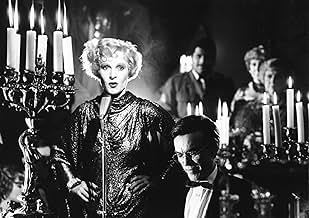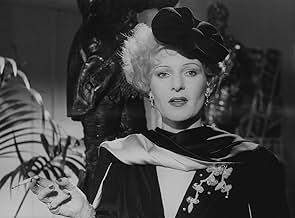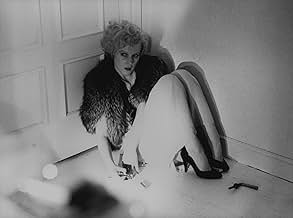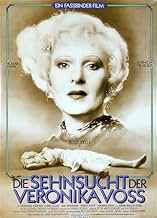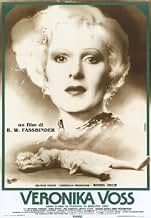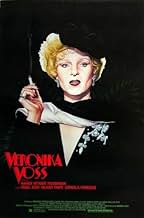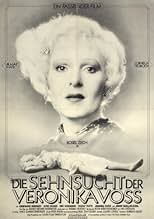NOTE IMDb
7,6/10
8,1 k
MA NOTE
Une actrice déchue du cinéma allemand, retenue par son médecin, éveille les soupçons d'un journaliste sportif.Une actrice déchue du cinéma allemand, retenue par son médecin, éveille les soupçons d'un journaliste sportif.Une actrice déchue du cinéma allemand, retenue par son médecin, éveille les soupçons d'un journaliste sportif.
- Réalisation
- Scénario
- Casting principal
- Récompenses
- 4 victoires et 4 nominations au total
Günther Kaufmann
- G.I.
- (as Günter Kaufmann)
- …
Avis à la une
In a career spanning a mere sixteen years, Rainer Werner Fassbinder made forty-four films before his death at just thirty-six, which occurred a few months after the premiere of this, the final part of what has come to be designated as his BRD Trilogy.
It is beautifully written by his regular collaborators Peter Marthesheimer and Pea Froelich, shot in knife-like black and white by his preferred cinematographer Xavier Schwarzenberger and as one would expect from this director, features a strong leading role for an actress, in this case Rosel Zech, whose character is loosely based upon that of the fascinating but tragic Sybille Schmitz who despite never being fully accepted by Herr Goebbels and company found it virtually impossible to continue her post-war career because of her perceived Nazi connections and whose drug-fuelled downward spiral ended in suicide in 1955.
Zech is simply stupendous in a demanding role that requires a wide range of emotions and as a bonus she performs a beguiling, Dietrich-like rendition of 'Memories are made of this." As a lesbian Dr. Feel-good, there is a magnificently chilling performance by Annemarie Dueringer. The entire cast is uniformly excellent and all of the characters are well drawn. Armin Mueller-Stahl again makes his presence felt whilst the influence of America in the Germany of the time is epitomised by the sound track and not least by the presence of the ubiquitous African-American GI played as always by Guenter Kaufmann. As well as being a tribute to the mighty UFA Studios, the relationship between fading star Voss and the journalist of Hilmar Thate is a nod to 'Sunset Boulevard'.
There is an absence of socio-political comment here and the whole enterprise succeeds solely through the myths of the movies. Fassbinder was an avowed devotee of the dream factory that was Hollywood and professed his adoration for Douglas Sirk. As it happened the master long outlived the pupil and Sirk offered a fitting tribute:"Although his fims were controversial.....only those things that survive opposition have the power of permanence."
It is beautifully written by his regular collaborators Peter Marthesheimer and Pea Froelich, shot in knife-like black and white by his preferred cinematographer Xavier Schwarzenberger and as one would expect from this director, features a strong leading role for an actress, in this case Rosel Zech, whose character is loosely based upon that of the fascinating but tragic Sybille Schmitz who despite never being fully accepted by Herr Goebbels and company found it virtually impossible to continue her post-war career because of her perceived Nazi connections and whose drug-fuelled downward spiral ended in suicide in 1955.
Zech is simply stupendous in a demanding role that requires a wide range of emotions and as a bonus she performs a beguiling, Dietrich-like rendition of 'Memories are made of this." As a lesbian Dr. Feel-good, there is a magnificently chilling performance by Annemarie Dueringer. The entire cast is uniformly excellent and all of the characters are well drawn. Armin Mueller-Stahl again makes his presence felt whilst the influence of America in the Germany of the time is epitomised by the sound track and not least by the presence of the ubiquitous African-American GI played as always by Guenter Kaufmann. As well as being a tribute to the mighty UFA Studios, the relationship between fading star Voss and the journalist of Hilmar Thate is a nod to 'Sunset Boulevard'.
There is an absence of socio-political comment here and the whole enterprise succeeds solely through the myths of the movies. Fassbinder was an avowed devotee of the dream factory that was Hollywood and professed his adoration for Douglas Sirk. As it happened the master long outlived the pupil and Sirk offered a fitting tribute:"Although his fims were controversial.....only those things that survive opposition have the power of permanence."
This movie left me feeling rather low. Its world is quite bleak. People are either strong or weak in the face of a society that feels cold. Looks like being strong won't make any difference in the long run. A very sad tale with beautiful black and white photography.
6sol-
Beautifully photographed in simple black and white, with some lovely gliding shots and some interesting camera angles and framing, the film is an amazement on a visual scope, even if the screenplay and acting are nothing special. Fassbinder's choice of lighting is excellent, giving true stark contrast between areas of black and areas of white in certain scenes. Sound is a significant aspect too, with soft radio recording heard in the background of just about every scene. The meaning behind such an audio style is not clear, but still it provides an interesting feel if not much else. As already alluded to however, the technical aspects outweigh the rest of the film. It is a rather cold tale with awkward characters, which are hard to sympathise with. Towards the end it also goes off on a bit of a tangent, from being a drama to a thriller. The film definitely seems more dedicated to its style than its substance, but that only makes is a certainly degree less fascinating to watch. The style quite literally sparkles and the film applies a few interesting editing tricks to change from scene to scene. If not involving as a tale, it is nevertheless great "eye candy".
Like many other Fassbinder films "Die Sehnsucht der Veronika Voss" tells about a decline and is very depressing. It is a visually stunning film that shows how much Fassbinder admired the classical Hollywood cinema and especially the films of Douglas Sirk. Like the films of his idol this film is stylish and artificial to an extreme extent which creates quite a distance between itself and the audience. Probably an even greater distance, since the style and the artificiality are used more consciously here, even as a instrument of alienation. So it is more fascinating than touching or even moving and might leave one even cold. Nevertheless the story is intriguing and it really tells something about the post war society in West Germany, so the film is interesting and even fascinating to watch. The scene where Rosel Zech as Veronika sings "Memories Are Made Of This" is very haunting, a gem.
In the 50's, in a rainy night in Germany, the sports reporter Robert Krohn (Hilmar Thate) offers his umbrella to the former successful UFA actress Veronika Voss (Rosel Zech) but he does not recognizes her. Later she calls him inviting for a drink, and he finds an unstable and decadent actress living in her past success. In a mixed sensation of love, empathy and curiosity, Robert has an affair with Veronika, and discloses a dangerous gang leaded by Dr. Marianne Katz (Annemarie Düringer) that addicts wealthy patients in morphine to get their fortune when they die.
"Die Sehnsucht der Veronika Voss" is a melancholic, bitter and depressive tale based on the reality of an era, and the association with "Sunset Boulevard" is immediate. The story is based on the last years of the German actress Sybille Schmitz (1909-1955), who died due to an overdose of sleeping pills. The performance of Rosel Zech is impressive, showing the glamour of a former star in the Nazi period and the depression of an addicted woman in the 50's. Hilmar Thate is also perfect in the role of a simple innocent man that faces a greedy world of pain and death. The magnificent cinematography in black and white, using perfectly light and shadows, is homage to the Golden Age of Hollywood. My vote is eight.
Title (Brazil): "O Desespero de Veronika Voss" ("The Despair of Veronika Voss")
"Die Sehnsucht der Veronika Voss" is a melancholic, bitter and depressive tale based on the reality of an era, and the association with "Sunset Boulevard" is immediate. The story is based on the last years of the German actress Sybille Schmitz (1909-1955), who died due to an overdose of sleeping pills. The performance of Rosel Zech is impressive, showing the glamour of a former star in the Nazi period and the depression of an addicted woman in the 50's. Hilmar Thate is also perfect in the role of a simple innocent man that faces a greedy world of pain and death. The magnificent cinematography in black and white, using perfectly light and shadows, is homage to the Golden Age of Hollywood. My vote is eight.
Title (Brazil): "O Desespero de Veronika Voss" ("The Despair of Veronika Voss")
Le saviez-vous
- AnecdotesBased on the true story of German film star Sybille Schmitz.
- GaffesThe film is set in 1955 but the song "The Battle of New Orleans" by Johnny Horton, released in 1959, is heard on the radio a number of times.
- Citations
Dr. Marianne Katz: Artists are different from ordinary people. They are wrapped up in themselves, or simply forgetful.
Meilleurs choix
Connectez-vous pour évaluer et suivre la liste de favoris afin de recevoir des recommandations personnalisées
- How long is Veronika Voss?Alimenté par Alexa
Détails
- Date de sortie
- Pays d’origine
- Langues
- Aussi connu sous le nom de
- Veronika Voss
- Lieux de tournage
- Sociétés de production
- Voir plus de crédits d'entreprise sur IMDbPro
Box-office
- Budget
- 2 600 000 DEM (estimé)
- Montant brut aux États-Unis et au Canada
- 8 144 $US
- Week-end de sortie aux États-Unis et au Canada
- 11 623 $US
- 16 févr. 2003
- Montant brut mondial
- 8 158 $US
- Durée
- 1h 44min(104 min)
- Couleur
- Mixage
- Rapport de forme
- 1.66 : 1
Contribuer à cette page
Suggérer une modification ou ajouter du contenu manquant

